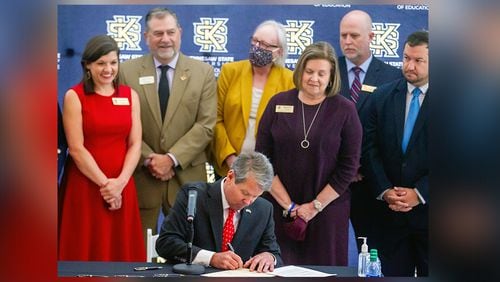With state tax revenues soaring, teachers may finally get the rest of a long-promised pay raise that could bolster a workforce battered by a pandemic.
In his first year as governor, Brian Kemp secured a $3,000 teacher pay raise, but the COVID-19 pandemic interrupted his plans for the rest of the $5,000 he promised as a candidate in 2018.
Now Georgia has billions in surplus revenue, and Kemp has been signaling that teachers will get the rest of that raise.
“When I talked to Gov. Kemp, he said he was going to do everything that he could to make sure that the teachers get the money,” said Verdaillia Turner, president of the Georgia Federation of Teachers.
The Professional Association of Georgia Educators, the state’s largest teacher advocacy group, also thinks “the long-promised $2,000 educator pay raise is one of the governor’s budgetary priorities,” Executive Director Craig Harper said in a written statement to The Atlanta Journal-Constitution.
Kemp’s office had no comment. Both teacher groups noted that the General Assembly, which returns next week, would still have to approve any raise he might propose.
Lisa Morgan, a teacher who leads the Georgia Association of Educators, also expects Kemp to give teachers a raise. She noted that bus drivers, cafeteria workers and other school employees aren’t included.
Lawmakers who handle the budget didn’t want to comment on what the governor might do. But Sen. Blake Tillery, R-Vidalia, said lawmakers must consider inflationary costs for things like fuel, steel and tires.
“I’m very cautious about rising expenses,” said Tillery, chairman of the Senate Committee on Appropriations.
Even if a raise does materialize, it might not be enough to bolster what observers see as a declining workforce.
“A lot of kudos for them to follow through on that, but there’s still a lot of work ahead,” said Stephen Pruitt, president of the Southern Regional Educational Board.
The average overall salary for Georgia teachers was just over $60,000 during the 2019-20 school year, according to an online “dashboard” Pruitt’s group created for policymakers. That’s at least $5,000 more than the average for the 16 Southern states his group works with but about $3,500 less than the national average.
After deducting their contributions to pension and health care programs, net teacher pay in Georgia is much lower. It averaged just over $27,000 in a teacher’s first year, rising to just over $40,000 in mid-career and then above $53,000 around retirement.
Teachers in rural areas with a smaller tax base — and lower cost of living — typically take home less than the average. Wages vary even within metro Atlanta.
A teacher with a bachelor’s degree can expect to earn $1.68 million over a lifetime working for Gwinnett County Public Schools, the state’s largest district, according to a recent report by the National Council on Teacher Quality. A teacher with the same qualifications would earn $1.85 million in Atlanta Public Schools.
But Atlanta’s relatively high pay is below what teachers could earn in another field.
“Atlanta Public Schools stands at the top of the state’s lifetime earnings rankings both for teachers with a bachelor’s or a master’s degree, but also offers 4 cents less per dollar earned by comparable professionals in their locality,” the report says.
Further complicating the teacher recruiting and retention challenge, Pruitt said, are surveys saying pay ranks below their other concerns, like support on the job and perceptions of the profession.
Shannon Holston, policy and programs chief with the National Council on Teacher Quality, said pay is still key, though. She said teacher raises have not kept pace with inflation.
“Pay is one way to raise the status of the profession,” she said.







